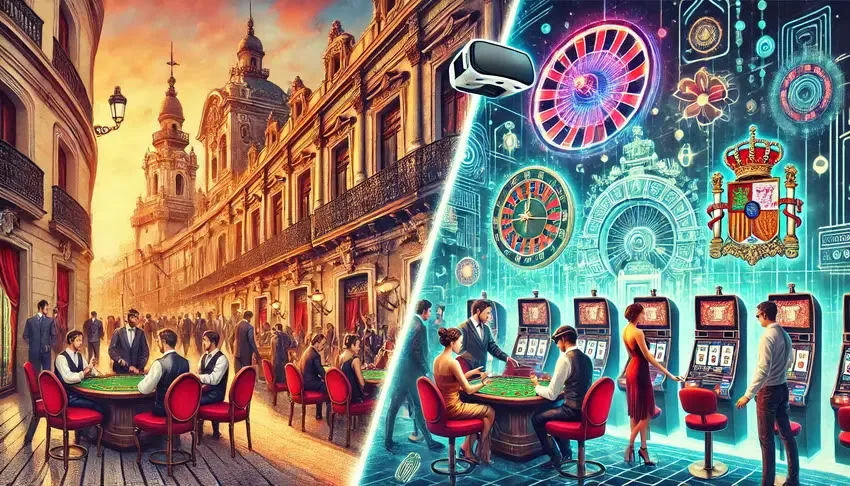Spanish Gambling Culture: From Traditional Casinos to Online Platforms

Gambling has been an integral part of Spanish culture for centuries, evolving from local betting traditions to sophisticated gaming establishments and, most recently, digital platforms. The country’s vibrant gambling scene reflects its rich history, social habits, and evolving technological landscape. Today, Spain offers a diverse range of gambling options, from land-based casinos to cutting-edge online platforms that provide users with advanced features, interactive interfaces, and a wide variety of games. These modern services cater to different player preferences and continue to grow in popularity, thanks to user-friendly design, mobile compatibility, and a strong focus on entertainment and player safety. Additionally, government regulation ensures legal oversight, while licensed platforms attract both local and international users seeking secure, immersive, and well-supported digital gambling experiences.
Spain’s gambling market is among the most regulated in Europe, ensuring fair play and responsible gaming. While traditional casinos continue to attract enthusiasts with their luxurious settings and classic games, online platforms have surged in popularity, offering convenience and innovation. The shift from physical to digital gambling mirrors broader global trends, but Spain’s distinct approach is deeply rooted in its history and legal framework.
Historical Context of Gambling in Spain
Spain’s gambling history dates back to ancient times when betting on games of chance was a common pastime. Throughout the Middle Ages, various forms of gambling, including card games and dice, were played in taverns and noble courts. However, it was not until the 18th century that structured gambling establishments began to emerge.
In the early 20th century, Spain saw the rise of organised betting houses and casinos. These venues became social hubs where players gathered for entertainment and networking. However, during Francisco Franco’s dictatorship (1939–1975), strict laws banned most forms of gambling, driving the activity underground and limiting its growth.
After Franco’s regime ended, Spain underwent significant legal reforms, leading to the re-emergence of casinos and other gambling activities. The 1980s marked a turning point, with the government introducing regulations that legalised and monitored the gambling industry, paving the way for modern casinos and betting platforms.
Traditional Casinos in Spain
Spain boasts a number of world-class casinos that attract both locals and tourists. Iconic venues such as Casino de Madrid and Casino Barcelona offer a mix of classic table games, slot machines, and poker tournaments in lavish surroundings. These casinos have long been associated with luxury and high-stakes gaming.
Beyond the major cities, gambling enthusiasts can find impressive establishments in coastal regions and resort destinations. Places like Casino Marbella and Gran Casino Costa Brava cater to both casual players and high rollers, offering an exclusive gaming experience alongside fine dining and entertainment.
Despite the rise of online gambling, traditional casinos remain an essential part of Spain’s gaming culture. Many players still appreciate the atmosphere of a land-based casino, where the social element and tactile experience add to the thrill of the game. The challenge for these venues is to balance tradition with modernity in an increasingly digital age.

Legalisation and Regulation of Gambling
The Spanish government has played a crucial role in shaping the gambling industry through strict regulations. The first major step towards legalisation occurred in 1977, when land-based casinos were officially recognised and licensed. Over the following decades, regulatory frameworks were strengthened to ensure fair play and consumer protection.
In 2011, the Spanish Gambling Act (Ley 13/2011) revolutionised the industry by introducing a comprehensive legal structure for online gambling. This legislation established licensing requirements, tax obligations, and responsible gaming measures, ensuring that all authorised operators adhere to high standards. The act marked a turning point in Spain’s regulatory approach, bringing clarity and control to a rapidly growing digital market. Licensed platforms must comply with strict rules regarding transparency, fair play, and player protection. These regulations have helped foster a safer gambling environment, encouraging both consumer trust and the growth of a competitive, well-regulated online gaming sector. Moreover, the law continues to evolve, adapting to new technologies and market needs, including improved tools for self-exclusion, advertising restrictions, and enhanced identity verification protocols for user protection.
Today, the Dirección General de Ordenación del Juego (DGOJ) oversees all gambling activities in Spain, enforcing laws that protect players and prevent illegal operations. Strict advertising guidelines, self-exclusion programmes, and age restrictions are also in place to promote responsible gaming and safeguard vulnerable individuals.
The Rise of Online Casinos and Digital Gambling
The advent of digital technology has transformed the gambling industry in Spain, making online casinos a dominant force. Platforms like Pasino casino online provide a seamless gaming experience, allowing players to enjoy slots, poker, and live dealer games from their devices.
One of the key drivers of online gambling’s popularity is accessibility. With mobile-friendly platforms and secure payment options, players can participate in their favourite games anytime, anywhere. The introduction of live dealer technology has further bridged the gap between virtual and physical gaming experiences.
Spain’s online gambling market continues to grow, with operators focusing on innovation to enhance user engagement. Virtual reality (VR) casinos, blockchain-based gaming, and artificial intelligence-driven personalisation are among the trends shaping the future of digital gambling in the country.
Sports Betting: The Spanish Love of Football and Beyond
Sports betting is a major component of Spain’s gambling culture, with football being the primary focus. La Liga, featuring clubs like Real Madrid and FC Barcelona, generates billions in betting revenue annually. Fans place wagers on match outcomes, player performances, and in-game events, making sports betting a deeply embedded part of Spanish sports culture.
Beyond football, other sports like basketball, tennis, and Formula 1 also attract significant betting activity. Spanish sportsbooks offer a variety of markets, covering both domestic and international sporting events. The rise of esports has further expanded the betting landscape, appealing to a younger audience.
The Spanish government regulates sports betting to ensure fairness and integrity. Licensed operators must comply with strict guidelines, including measures to combat match-fixing and underage gambling. As the industry evolves, new technologies such as AI-powered analytics and real-time data integration are enhancing the sports betting experience.
The Future of the Spanish Gambling Market
Spain’s gambling industry is poised for continued expansion, driven by technological advancements and evolving consumer preferences. Online platforms like Pasino casino online will likely integrate more immersive features, such as augmented reality (AR) gaming and interactive social elements.
Regulatory changes may also shape the future of gambling in Spain. While current laws ensure player protection, potential adjustments could introduce stricter advertising controls, higher taxation, or enhanced responsible gaming measures. The challenge for operators will be to adapt while maintaining a competitive edge.
Despite the uncertainties, Spain remains a key player in the global gambling market. With a balance between tradition and innovation, the country’s gaming culture will continue to thrive, offering players diverse and exciting gambling experiences both online and offline.




